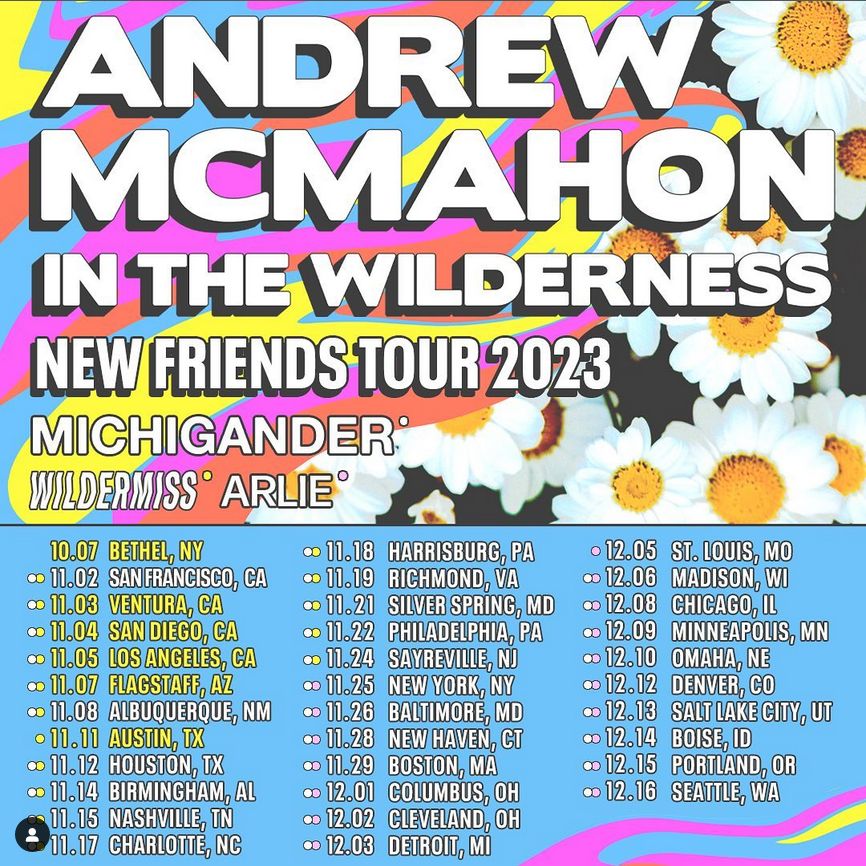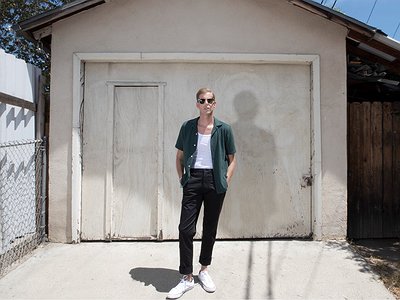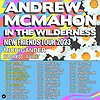Name: Andrew McMahon
Occupation: Singer, songwriter
Nationality: American
Recent release: Andrew McMahon's Tilt at the Wind No More is out via Nettwerk. He is also currently on an extensive American tour. 
If you enjoyed this Andrew McMahon interview and would like to find out more about his work and current projects, visit his official website. He is also on Instagram, twitter, and Facebook.
Where does the impulse to create something come from for you? What role do often-quoted sources of inspiration like dreams, other forms of art, personal relationships, politics etc play?
For the most part inspiration arrives when I'm sitting at the piano. It's a bit of a cat and mouse game. I start to play and usually the words arrive. There is something that takes place in that moment that helps to unlock my subconscious and then I do what I can to chase it down. I keep journals and notes as well and often I find subject matter and bits of poetry that will lead me to a song.
I also like to collaborate with other writers and the process is similar. We collectively start playing or building an aesthetic in the speakers and then there is a collaborative volleying back and forth of melodies and words.
As far as sources I pull from, dreams can be useful but I think my relationships with others and with my own personal journey are generally what I lean on. I also try to keep my eye on the places and scenery I encounter when I'm working through material to add a visual sense to the songs I write.
For you to get started, do there need to be concrete ideas – or what some have called a 'visualisation' of the finished work? What does the balance between planning and chance look like for you?
For the most part the element of chance and chasing the mood of the music is where I start.
That being said, it's not uncommon to find a lyric or a theme in my day to day that motivates me to start the writing process or that I'll use as a jumping off point when I collaborate with other writers and producers.
Is there a preparation phase for your process? Do you require your tools to be laid out in a particular way, for example, do you need to do 'research' or create 'early versions'?
When I work with other writers I often journal to get my bearings on where I am emotionally ahead of the session and account for stories or themes that have materialized recently. This can be a helpful tool to remove some pressure.
At home when I'm writing alone I'm far less structured though.
Do you have certain rituals to get you into the right mindset for creating? What role do certain foods or stimulants like coffee, lighting, scents, exercise or reading poetry play?
To me setting aside the time to write is the ritual.
Many artists are different but when I'm motivated to create but don't necessarily have an agenda or a song that is welling up inside of me sometimes just the act of playing and leaving that channel open is the best way to unlock some truth worth singing about.
What do you start with? How difficult is that first line of text, the first note?
It really depends. If I have a phrase or a line that feels like it could open the door to a larger concept I'll often sit with it at the piano and see how it sings.
Otherwise I'll play until a melody or lyric reveals itself to me.
When do the lyrics enter the picture? Where do they come from? Do lyrics need to grow together with the music or can they emerge from a place of their own?
Generally at the very beginning. Lyrics are everything to me and regardless of how much I like a piece of music I'm working on, if I can't find the words that spur on the creation I tend to walk away.
I wish I knew where the words come from but when they truly flow it's clear they are a manifestation of my desire to understand something or answer a question. Sometimes they help me connect with something deeper within myself or help me see the world more clearly.
What makes lyrics good in your opinion? What are your own ambitions and challenges in this regard?
In my work, a good lyric generates emotion and a sense of connection, first with me as the writer and then with the audience. If they don't accomplish both then generally the song isn't a success.
I like lyrics that feel personal and specific while creating a feeling in the audience that they are their words and their story. That's what the best songs do. I also think writing visually and creating a scene is a very powerful tool and helps to distinguish a song as more than an emotional or commercial craft but something more literary.
The challenge of course is rising to the high bar I set for a lyric. I've walked away from a lot of well written pop songs that I didn't feel connected to because the lyric didn't make me feel connected to the music and that can be frustrating.
To quote a question by the great Bruce Duffie: When you come up with a musical idea, have you created the idea or have you discovered the idea?
I believe it's a combination of the two but think writing is heavily weighed in discovery. The good ideas often feel more like they are channeled through you then they are written by you.
The creation part and the craft for me comes in the form of editing- the time spent honing what was discovered and forming it into something that feels satisfying from start to finish.
Once you've started, how does the work gradually emerge?
I'm a very linear writer. It is hard for me to write a chorus if I haven't finished the verse. I need to understand or connect to the beginning of the process to proceed.
Once I've made it to the chorus things fall into place quickly though. If everything is aligned musically and lyrically through the first chorus it tends to indicate a song is worth finishing and I finish it.
Many writers have claimed that as soon as they enter into the process, certain aspects of the narrative are out of their hands. Do you like to keep strict control or is there a sense of following things where they lead you?
I think it's important to allow yourself the freedom to follow the song where it leads you in every sense. Demanding a certain narrative from the start can be a useful tool for certain kinds of writing. If I'm writing an assignment for a tv show or a film for instance.
I'd probably be better served at times giving myself structure like that but most of my favorite songs I've written are those I allow to flow through me rather than holding on too tight.
Often, while writing, new ideas and alternative roads will open themselves up, pulling and pushing the creator in a different direction. Does this happen to you, too, and how do you deal with it? What do you do with these ideas?
Very much so. When I'm at my best, new melodies and sections of music will start collecting as the process evolves. Those pieces can often be moved around modularly as the song takes shape. Verses can be swapped, what I thought was a strong chorus can be bested down the line etc and the original chorus could work as the bridge.
It works differently for everyone but I've been regularly surprised how the song I thought I was writing can magically transform the harder I lean into the writing process.
There are many descriptions of the creative state. How would you describe it for you personally? Is there an element of spirituality to what you do?
When it's working, whether that is alone in my studio or with other writers, there is a sense of buoyancy and possibility that is highly energetic and yes, at times spiritual. That feeling is why I write.
Some call it flow and I think that's a fair characterization. There is a sense that you are doing something meaningful, that you are chasing down something of value and that you are in this place in this moment for that specific reason.
There is a sense of play and wonder that I liken very much to being a kid.
Once a piece is finished, how important is it for you to let it lie and evaluate it later on? How much improvement and refinement do you personally allow until you're satisfied with a piece? What does this process look like in practise?
Once I feel good about the core of the song I like to leave it alone. I'll continue to play and revise in the days following the initial spark but I tend to move on quickly and wait to finish things in a studio.
The true test of a good song is how it reads in the studio through the speakers and I like leaving tasks on the table so that there is still some writing taking place as the production develops.
What's your take on the role and importance of production, including mixing and mastering for you personally? How involved do you get in this?
The recording process is almost as essential as the writing of the song itself.
This process varies considerably with each song but I am never truly satisfied with a song until I can listen to it on repeat and feel completely locked into its lyrical and emotional core.
After finishing a piece or album and releasing something into the world, there can be a sense of emptiness. Can you relate to this – and how do you return to the state of creativity after experiencing it?
Truer words have never been spoken. There is a grieving period when the work is truly over. This for me tends to last until it's released and in the case of my last album that window was open far too long.
The truth is you just have to keep writing, even if it's garbage. When a song finally emerges that feels like the next chapter I begin rebuilding and lean in.
Creativity can reach many different corners of our lives. Do you personally feel as though writing a piece of music is inherently different from something like making a great cup of coffee? What do you express through music that you couldn't or wouldn't in more 'mundane' tasks?
I would never suggest that one form of creativity is more personally valuable than another. I think it's important for all people to find the creative outlets that bring them joy and return to them regularly. I've had meals that I'll remember forever and pieces of clothing that have lived in my closet for decades and I respect their creators every bit as much as my favorite songwriters.
However, I do think there is a distinction between creative craftspeople who have chosen to share their work and develop their skills into a career and less consuming creative pursuits. Through music I'm able to connect to and unlock a part of myself that I have never been able to through traditional interactions and other pursuits.
I wrote my first song when I was a kid and it felt like I had discovered some missing part of myself. That feeling is the reason I keep going back to the well.





